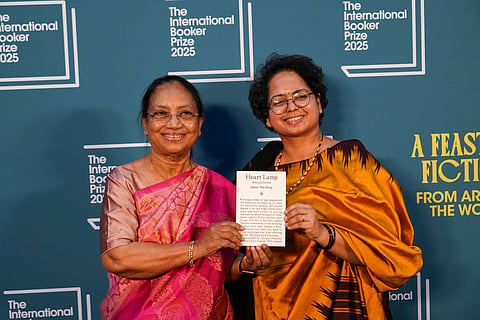

In the pre-dawn hours, while most of India lay asleep, a quiet yet profound history was being made on the global stage. At London's Tate Modern Museum, Heart Lamp, a collection of twelve short stories written in Kannada by Banu Mushtaq and translated into English by Deepa Bhasthi, won the International Booker Prize—marking not just the first time Kannada has received this honour, but also the first time a short story collection has been awarded the prize.
In that singular moment—when the prize was announced and two women, from two different generations, embraced on stage—something more than literature was being recognised. It was a lifetime of silences broken, struggles voiced, and a language long confined to the margins now carried to the centre of the world.
As she accepted the award, Banu Mushtaq spoke with quiet gravity: "This book was born from the belief that no story is ever small—that in the tapestry of human experience, every thread holds the weight of the whole... Literature remains one of the last sacred spaces where we can live inside each other's minds. Tonight is not an end point; it is a torch passed."
A torch, indeed, passed from the often-erased histories of Muslim women in southern India to the hands of readers across the globe. Heart Lamp, written between 1990 and 2023, speaks in colloquial, raw, and vividly intimate prose of the interior lives of women—those pushed to the edges by religion, patriarchy, and poverty, yet defiantly alive with thought, wit, and desire.
From Hassan to the world stage
Born in 1954 in a small town in Karnataka's Hassan district, Banu Mushtaq began her education studying the Quran, before her father—a government worker—enrolled her at a Kannada-medium missionary school in Shivamogga. She was eight. Within six months, she was fluent in Kannada, a language she would not only adopt, but fiercely defend as a writer, lawyer, and activist.
She married her love at 26. A year later, her first story was published. But behind her literary journey lay profound personal trials, including depression, isolation, and the often-invisible labour of motherhood.
"I had always wanted to write but had nothing to write (about) because suddenly, after a love marriage, I was told to wear a burqa and dedicate myself to domestic work," she once recalled.
Years later, enraged by the moral policing of a female teacher by a Muslim youth group, Mushtaq wrote a fiery article that was published in Lankesh Patrike. The same tabloid that was edited by slain journalist Gowri Lankesh’s father, renowned for his firebrand journalism, she said, was "thrilling"—it marked her re-entry into the world of public expression, and the beginning of a literary rebellion.
Deepa Bhasthi: The silent architect of this victory
While Banu carved her path through decades of activism and prose, Deepa Bhasthi, from the hills of Kodagu, was quietly finding her own voice. A journalist by training, she wrote for publications like The New Indian Express, The Times of India, Scroll, The Caravan and Himal Southasian, before retreating from the noise of the mainstream to translate, write, and live in Madikeri.
"The story of the world," she said during her Booker speech, "is a history of erasures... of how women and those on the many margins of this world live and love. This prize is a small win in a long, ongoing battle against such violence."
Bhasthi's translation of Heart Lamp is not just linguistic—it is an act of preservation, revival, and resistance. By choosing to translate into English from Kannada, Bhasthi went against the grain of a trend where Indian literature is often mediated only through Hindi or urban centres. She chose instead to illuminate a voice rarely heard abroad—and did so with fidelity and fierce intention.
Two women, two generations, one language
As the two stood side-by-side in simple saris, smiling, not posturing, the symbolism was striking. Banu, whose stories had given Kannada Muslim women their first modern literary mirror, and Deepa, who carried those stories to the world — not with fanfare, but with quiet radicalism.
It was a moment of unexpected, almost impossible beauty. It was also a pointed answer to a culture that too often says "Kannad gothilla" ("I don't know Kannada") with performative detachment. Here were two women who had not only lived Kannada—they had lit it like a lamp in the dark.
Bhasthi's translation preserved not just the meaning of Mushtaq's stories, but their soul—the everyday textures of southern Muslim women's lives, their invisible labour, their impossible joys, their tenacious dignity. Together, their labour has not only brought Kannada to the world stage but has challenged the silence imposed on countless lives.
Wednesday's moment on that global stage in London, with two women in simple saris embracing each other, was extraordinary in its quiet power. There were no orchestrated chants, no symbolic flag-waving. Just honesty, humility, and a love for a language that has often been sidelined even in its own home. In a country where Muslims are routinely vilified, where a sitting leader questions women's ability to be free, and where Kannada speakers still resist the daily pressures of Hindi imposition, this win is a kind of poetry. A kind of justice.
Both women have stood apart from literary networks and metropolitan cliques. Mushtaq, by choosing to remain in Hassan, working as a lawyer while writing steadily, and Bhasthi, by moving away from the limelight of mainstream English journalism to dedicate herself to literature and translation from her small town in the hills.
This is the truth beneath the surface, once the noise of rhetoric is stripped away.
A Muslim woman who chose to write in Kannada.
A translator who chose literature over trends.
A language that speaks honey and fire.
A prize that, finally, listened.
And Kannada—our river of honey, our rain of milk—shines now, a Heart Lamp lit for the world to see.
(The author is a writer and translator. She lives in Mysore)